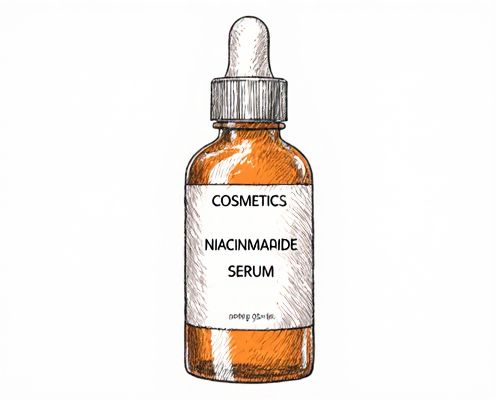
Niacinamide Serum Illustration
Niacinamide serum is a powerful skincare product known for its ability to reduce inflammation, minimize pores, and improve uneven skin tone. Its antioxidant properties help protect the skin from environmental damage while boosting collagen production for a smoother, firmer complexion. Regular use of niacinamide serum enhances overall skin texture and reduces the appearance of fine lines and blemishes.
Understanding Niacinamide: The Skincare Powerhouse
Niacinamide, also known as vitamin B3, is celebrated for its multifaceted skincare benefits including balancing oil production, minimizing pore appearance, and improving skin texture. This potent ingredient enhances the skin barrier, reduces inflammation, and boosts hydration, making it ideal for acne-prone, sensitive, and aging skin types. Scientific studies highlight niacinamide's ability to fade hyperpigmentation and protect against environmental damage, positioning it as a key component in effective serum formulations.
Key Benefits of Niacinamide Serum for Women's Skin
Niacinamide serum enhances women's skin by reducing inflammation and minimizing the appearance of pores, leading to a smoother complexion. It boosts ceramide production, which helps retain moisture and strengthens the skin barrier against environmental damage. Consistent use also evens skin tone by fading hyperpigmentation and reducing redness for a clearer, radiant look.
How Niacinamide Serum Works in Cosmetic Products
Niacinamide serum enhances skin barrier function by boosting ceramide production, which improves moisture retention and reduces transepidermal water loss. It regulates sebum secretion and minimizes pore appearance, making it ideal for oily and acne-prone skin. The anti-inflammatory properties of niacinamide also help diminish redness and hyperpigmentation for a more even skin tone.
Formulating Niacinamide Serum: Essential Ingredients and Concentrations
Formulating niacinamide serum requires precise concentrations, typically between 2% to 10%, to maximize skin benefits like reducing hyperpigmentation and improving barrier function. Key ingredients include a stable base such as purified water or aloe vera gel, complementary antioxidants like vitamin C or E, and humectants such as hyaluronic acid for enhanced hydration and absorption. Maintaining a pH level around 5.0 to 7.0 ensures niacinamide remains effective and minimizes skin irritation during topical application.
Choosing the Right Niacinamide Serum for Your Skin Type
Selecting the ideal niacinamide serum depends on your skin type and specific concerns, such as dryness, oiliness, or sensitivity. For oily or acne-prone skin, choose lightweight, non-comedogenic formulas with 5% niacinamide concentration to reduce sebum and inflammation. Dry or sensitive skin benefits from hydrating serums with added soothing ingredients like hyaluronic acid or ceramides combined with lower niacinamide percentages to prevent irritation.
Niacinamide and Sensitive Skin: Compatibility and Tolerability
Niacinamide, a form of vitamin B3, is highly compatible with sensitive skin due to its anti-inflammatory properties and ability to strengthen the skin barrier, reducing redness and irritation. Clinical studies show that niacinamide serums minimize sensitivity by improving skin tolerance and hydration without causing adverse reactions. Consistent use enhances overall skin resilience, making niacinamide an ideal active ingredient for calming and repairing sensitive skin types.
Combining Niacinamide with Other Active Ingredients
Niacinamide serum enhances skin benefits when combined with active ingredients like hyaluronic acid, which boosts hydration, and salicylic acid, which improves acne control. Pairing niacinamide with antioxidants such as vitamin C maximizes anti-aging effects by brightening and reducing hyperpigmentation. Formulations that include niacinamide with peptides also support collagen production and skin firmness for a comprehensive skincare routine.
Common Myths and Facts About Niacinamide in Skincare
Niacinamide serum is often misunderstood, with common myths suggesting it causes skin irritation or is ineffective for acne; however, clinical studies confirm its anti-inflammatory properties and ability to reduce sebum production, making it suitable for sensitive and acne-prone skin. Contrary to popular belief, niacinamide works well in combination with other active ingredients like retinol and hyaluronic acid without reducing their efficacy. Regular use of niacinamide serum improves skin barrier function, brightens complexion, and minimizes pore appearance, backed by dermatological research.
How to Incorporate Niacinamide Serum Into Your Routine
To effectively incorporate niacinamide serum into your skincare routine, apply a few drops onto clean, dry skin after cleansing and toning but before moisturizing. Use it twice daily, morning and night, to target issues like uneven skin tone, enlarged pores, and redness. Consistent use maximizes benefits, improving your skin's texture and overall radiance.
Clinical Evidence: Niacinamide’s Impact on Women’s Skin Health
Clinical studies demonstrate that niacinamide serum significantly improves women's skin health by reducing hyperpigmentation, fine lines, and inflammation. Its anti-inflammatory and antioxidant properties enhance skin barrier function and hydration, promoting a more even and radiant complexion. Incorporating niacinamide serum into your skincare routine supports long-term skin resilience and overall appearance.
 womendy.com
womendy.com